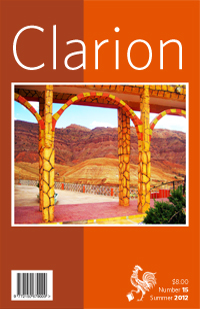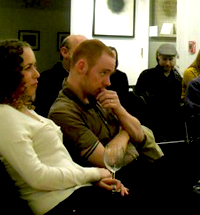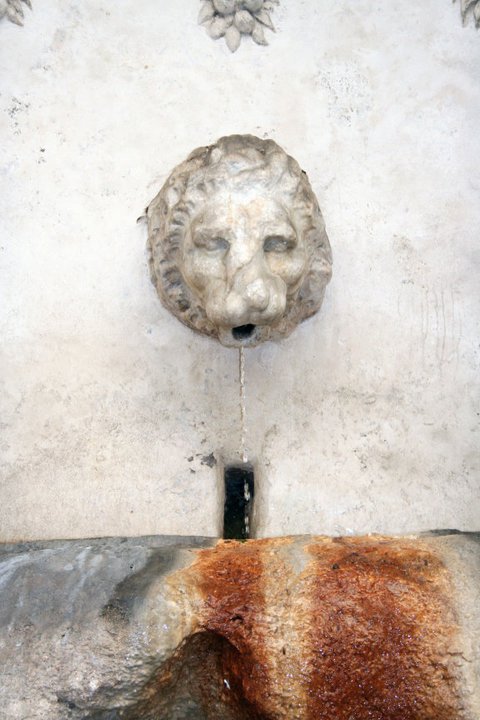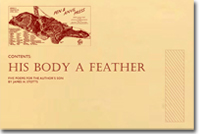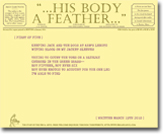|
an interview by Anne Whiting with
An interview in April. It had down-poured the hour prior to my meeting with James Stotts at the Arnold Arboretum. I meet Stotts outdoors in the park; his clothes are the color of charcoal. His orange hair peeks out from under a black knit cap; it is the only trace of brightness amid the ungreen foliage and gray sky. He carries an umbrella at his side. The Arboretum is where Stotts, over the course of many visits with his dog and his young son, had gathered inspiration for the five poems published in chapbook form as His Body A Feather by Pen & Anvil in the January 2011. We start walking; gravel crunches. The place is peaceful, mostly deserted. I ask Stotts why he writes poetry. Brief pause. "Because I'm scared that I'm going to forget places," he says. "I see something in a place I've never been, and I feel like I should start putting it away. Poetry is a way you can remember things." Simple reply. Stotts had come to Boston College for graduate studies in Russian literature and linguistics after completing a BA in Russian at the University of New Mexico. He quit about four years ago when he and his wife Masha, whom he met in Russia, had their son Jackson. "BC was just an excuse to come to Boston, really," he says. It rains a little; Stotts doesn't open his umbrella. Born and brought up in Albuquerque, he says he loves the Boston winter, its weather. I take that to mean he likes this spring rain -- if rain can be a feeling, that's the sort of mood I experience when I read his poems. I ask him to describe the style of his poetry. "There's a writer here, Melissa Green, who likes to say I'm like Dylan Thomas," he says. "People compare to me to the alcoholic poets, the suicidal poets." But he calls his work 'old lady poetry'. "I really like to write about birds, or the flower I see in the backyard. I write a lot about people I miss who are dead, like Joseph Brodsky. He died in 1996 and is buried in Venice. He'd become pretty much the most famous poet in the world at that point, and I always felt like I should have gotten a chance to meet him, because he was only 55."
Brodsky was a Russian-American poet, one of the many Stotts reads and translates as a scholar of the poetic generation of Russia between the wars. "The Silver Age," he tells me it is called -- the generation just after the Revolution whose members wrote poems when they were all about his age (Stotts is not yet 30). His translations are published in a number of journals; books, he says, are forthcoming, though I don't press him to tell me when, from which publisher. "Why Russian?" I ask him. "Because my father and uncle were Russian, drafted in the Vietnam War," he says plainly. Stotts writes his poems in English. His work has appeared in AGNI, White Whale Review, Little Star, and The Critical Flame, among other publications. He blogs. In 2009, Stotts published a book-length collection of the poems he's written in Boston, Since. The poetry Stotts translates is recognizably classical, work out of the Russian declamatory tradition, with regular meters and formal schemes; alongside it, his own work is strikingly modern, with its absent capitalization, terse wording, and broken structure. Reading Since, I got the feeling that Stotts lets his linespacing do what it will, that it emerges spontaneously as he writes. But I'm wrong. He tells me he writes with a basic line unit of five beats; lines which go over are indented to indicate a difference. In other words, it's all intentional, even if seems incidental. He's had to go into the back-end of his word processor to stop the autocorrect feature that wants to capitalize every first word of his lines. "So -- what's Since? Like, since what?" I ask, holding out the rain-spattered book. I'm starting to feel like I step too far if I infer anything in his language. As he explains his methods, I come to appreciate that there are conscious decisions underpinning each word. Stotts has an answer, albeit a gnomic one. "Since is, well, it's because. Since in the sense of 'because'," he muses. Ah, I grasp his meaning: 'as a consequence of', not 'from that point in time'. Birds sing. We keep walking. Stotts recites part of a poem by Robert Burns, one his son mostly knows by heart. We chat about the looming threat of the Asian long-horned beetle, and stop to examine a dormant rose. Stotts likes nature but "[doesn't] know anything about it." He says the Arboretum is the nicest park he's ever seen. "Better than Central Park." (Do I recall correctly that the landscape designer, Olmstead, also preferred the Arboretum over Central Park?) "It's like having my own English Garden," he says. "The city of Boston gave the Arboretum to Harvard for a dollar. I spent three years just working and coming up here. I try to write all the poems about this place that I can." We take a break to observe the honey locust -- "When they're growing, they're really soft," Stotts says -- and admire the birch and hawthorn trees, all mentioned in His Body A Feather. We reach the top of Peter's Hill and Stotts points to a tree he describes as a "crown of thorns on Peter's brow." From our elevation we look out over the evergreens. Buildings are far in the distance, beyond the fog left over by the day's rain. Against the quiet we hear a siren sounding from some point among the unseen streets. It's interesting, I think, how Stotts wanted so badly to come to Boston but that his favorite place is in the middle of a refuge that is very much not the city. Stotts doesn't adore technology. He writes his poems out in longhand before he types them. He thinks electronic data storage uses too much energy. Given the ubiquity of personal computing, he seems almost prodigal in his composing strategy: he writes and edits his poems in his head. When he finally puts them on paper, he hardly needs to revise. "It doesn't always have strict rhyme. But it's always musical. It's always written so I can memorize it," he says. We talk about his growing up in New Mexico, youngest of five children, and a member of a trio of triplets. One of his brothers is an artist in Brooklyn. No one else in the family is literary; New York artist-brother and Stotts are the only two of the siblings to graduate high school. He rarely traveled during childhood -- his family didn't have the wherewithal. They'd only been to visit relatives in Oklahoma and Kansas. When Stotts was sixteen, he got a job as a server and saved enough money to go to New Orleans. He's traveled further since then, too, to Russia of course, and to Rome -- he went there in 2010 at the invitation of Brodsky's literary executor to present Russian poets to the American Academy of Rome. These days, he mixes drinks at Temple Bar, between Porter and Harvard Squares on Mass Avenue in Cambridge. He bikes to work in the wintertime, all the way from Roslindale. They're moving soon, the poet and his wife and son, their dogs and his mother-in-law who has for a few years been a part of their household.
On the way back down to the park's entrance, Stotts points to a pond where his and other dogs like to play. (Said dogs are mentioned in the poems of His Body A Feather.) Stotts says he's done reading and editing for literary magazines, but he never really enjoyed it. "You have to read a lot of things you don't want to read," he explained. He abandoned writing his own novels when he began translating novels by Russian poets -- he calls it divorcing himself from prose. "So why poems, then?" I ask. I want to know why a poem is a better outlet for remembering than a picture with a description on the back of it. (Stotts is also a photographer). "Poetry is basically a way of putting things in a way that you can tell people," he says. "It's a way of living on." I've always felt that poetry becomes a part of a person, but Stotts is not too keen on discussing it if it is. He's a wealth of knowledge of Russian literary and culture history, and surely knows as much if not more about poetic innovation, but he's only willing to indulge conversation pertaining to the former. Asked about his use of metaphor: "Well, everybody does that." His approach to his profession sounds almost jejune. He talks with a dryness that makes you think the Southwest never went out of him, even if he does like the wet of Boston's rain. "Most poetry is just a desire for attention," he says. He wants to be in conversation with other literati; he goes to readings, he socializes a bit with other writers. He admits he wants to be widely read. Nonetheless, his advice to aspiring poets and collegiate literary dreamers isn't reassuring. "Don't do it," he says, in his characteristically stoic, modest voice. It's a voice of someone who thinks hard about everything he's saying, even if he ends up saying very little. Certainly he writes more than he says. In speaking to local literary figures -- magazine editors, bloggers with their eye on the scene, other poets -- I heard many iterations of the same point: James Stotts deserves the audience he quietly yearns for, as much as any writer you or I could name. One person said told me without any twinge of self-consciousness: "He's the real thing." Reading Since and His Body A Feather, I'm willing to believe that I see what they mean. The poems have a reflective, simple way of describing small and basic things that gives those small and basic things an almost divine nature. It's as if in the remembrancing his poems do, Stotts is preserving the essential quality of his subjects, rather than the worn particulars. You have to believe William Carlos Williams is one of his models, no less than Joseph Brodsky. And whatever resemblance his friend diagnosed between the life and psychic mood of James Stotts and that of the sad mantic Hart Crane, I can see a likeness in their use of language.
We're both in a good mood as we walk toward the park entrance to quit the woods and get back to our city lives. Stotts is still in a rain-mood, but it's a soft rain, the good kind, that clears things up. I'm surprised when he volunteers an observation on his poetics. "Each poem is an attempt at a kind of logic; that's what I mean when I say that I'm trying to make sense of things. If you find the right logic, that would be a justification for life. It'd be like the reason to live." _ _ Stotts posts poem drafts not infrequently at his blog, The Fugue Aesthetics of James Stotts. Readers interested in purchasing a copy of Since can send their mailing address to oerbooks@gmail.com. According to the publisher, "orders will be sent out posthaste as per the honor system as they are received, and will be accompanied by an invoice to be paid by check, cash, or money order." The book, published in limited edition of 200 copies, is available for $10. _ _ Anne Whiting is a student at Boston University, and a staff columnist for the The Daily Free Press. |
ISSN 2150-6795 |
